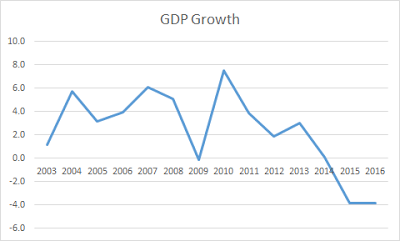Summary:
Overall from 2003 to 2016 about 2.4%. If the last two years (2016 being an estimate are not counted) it's 3.5%. The collapse does not explain the impeachment (on this more later). It's more the result of the Workers' Party administration already caving and accepting the austerity policies promoted by the opposition.
Topics:
Matias Vernengo considers the following as important: Brazil, Impeachment
This could be interesting, too:
Overall from 2003 to 2016 about 2.4%. If the last two years (2016 being an estimate are not counted) it's 3.5%. The collapse does not explain the impeachment (on this more later). It's more the result of the Workers' Party administration already caving and accepting the austerity policies promoted by the opposition.
Topics:
Matias Vernengo considers the following as important: Brazil, Impeachment
This could be interesting, too:
Matias Vernengo writes The behavior of the nominal exchange rate between the Brazilian Real and the dollar in 2024
Matias Vernengo writes Serrano, Summa and Marins on Inflation, and Monetary Policy
Matias Vernengo writes Very brief note on the Brazilian real and the fiscal package
Matias Vernengo writes 30 years of the Real Plan: Unoriginal Lessons from Latin American Stabilizations
Overall from 2003 to 2016 about 2.4%. If the last two years (2016 being an estimate are not counted) it's 3.5%.
The collapse does not explain the impeachment (on this more later). It's more the result of the Workers' Party administration already caving and accepting the austerity policies promoted by the opposition.
The collapse does not explain the impeachment (on this more later). It's more the result of the Workers' Party administration already caving and accepting the austerity policies promoted by the opposition.

